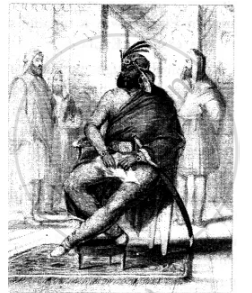Advertisements
Advertisements
प्रश्न
With reference to the rise and growth of Bengal as a regional power, discuss the failures of the nawabs of Bengal
उत्तर
The nawabs of Bengal, however, failed to understand the true nature and ulterior motives of the British trading company. They believed that a trading company could never challenge their authority. No efforts were made to reorganize and strengthen the army. Corruption was rampant, and even high-ranking officials were susceptible to bribes. These weaknesses made Bengal a happy hunting ground for the aggressive and imperialistic ambitions of the British.
संबंधित प्रश्न
Fill in the blanks:
_____________, the tenth Sikh guru, organized a military brotherhood of Sikhs called __________.
Choose the correct answer:
Shahu was an ease-loving and weak ___________ ruler.
Answer the following question in one or two words/sentences:
What followed the disintegration of the Mughal empire?
Answer the following question in one or two words/sentences:
How did political instability in the Carnatic benefit the European trading companies?
Answer the following question in one or two words/sentences:
Name any two principal Rajput states that took advantage of the declining power of the Mughals and asserted their independence.
This is a picture of the founder of the kingdom that extended the Khyber Pass in the north to Sindh in the south.
What effect did this treaty have on his policy of expansion?
Mention two important terms of the Treaty of Amritsar (1809).
Answer the following question
Which ruler was known as the Tiger of Mysore?
This is a picture of a great ruler of Punjab.

Identify him.
Match the contents of Column A and Column B
| Column A | Column B |
| 1. Nizam-ul-Mulk | (a) Tiger of Mysore. |
| 2. Shivaji | (b) founded the state of Hyderabad. |
| 3. Tipu Sultan | (c) founder of the Maratha power. |
| 4. Gaekwad | (d) united the Sikhs on the west of river Sutlej. |
| 5. Holkar | (e) Nagpur |
| 6. Scindia | (f) Baroda |
| 7. Bhonsle | (g) Indore |
| 8. Peshwa | (h) Gwalior |
| 9. Ranjit Singh | (i) Poona |
